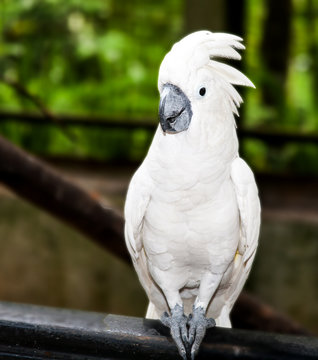Life With a Cockatoo: A Feathered Drama of Trust and Transformation 🦜
- Iqra Shaikh
- Jun 23
- 2 min read
Updated: 2 days ago
She wasn’t quiet about her arrival. A shrill squawk echoed through the house the moment the carrier opened. Perched on a travel perch was a white cockatoo, crest flared, eyes wide — all fire and fear rolled into one feathery ball. She had been surrendered by more than one home. “Too loud,” they said. “Too needy.”

But this time, her new home wasn’t looking for perfection. They saw the vulnerability behind her theatrics. Her new human didn’t reach for her immediately. Instead, they sat nearby, letting her shout and stomp and flare until she quieted on her own. Every day, they showed up again.
For weeks, the house was filled with her screams — part frustration, part loneliness. But gradually, something shifted. Her feathers stopped puffing at every movement. She leaned slightly forward when the human entered. One evening, she lifted her foot — a subtle gesture of invitation.
Touch came next. Carefully, gently. First on the head, then under the beak. Her eyes closed. It had been so long since she allowed herself to be vulnerable. She began to mimic laughter, repeat soft greetings, and cling to her person like a child afraid to be left behind.
The more she was heard, the quieter she became. She learned to dance, to whistle, to throw her toys dramatically when ignored — but it was all part of her charm now. The once-abandoned cockatoo had found a place where her intensity wasn’t punished but welcomed.
Now, she’s the queen of her domain. She follows her human from room to room, demands attention with a theatrical flair, and presses her beak to their cheek in moments of peace. Her trust wasn’t won easily — but once given, it was absolute.
📝 Pro Tip
Cockatoos are emotionally complex and crave constant companionship. If you can’t give them hours of attention each day, ensure they have enrichment, stimulation, and safe independence — or their behavior may spiral quickly.
❓ FAQs for Cockatoo Owners and Bird Enthusiasts
1. Are cockatoos difficult to care for?
Yes, cockatoos require a lot of attention, mental stimulation, and emotional engagement. They can be demanding but deeply rewarding.
2. Why do cockatoos scream or act out?
Screaming and destructive behavior often stem from boredom, lack of interaction, or unmet emotional needs. They are very social birds.
3. How do I build trust with a cockatoo?
Start with calm presence, talk softly, offer treats by hand, and avoid sudden movements. Patience and consistency are key.
4. Can cockatoos be left alone during the day?
Not for long periods. Cockatoos thrive on interaction and can develop behavioral issues if left alone frequently.
5. Do cockatoos bond with one person only?
Often, yes. Cockatoos can become closely bonded to a single individual, so it’s important to socialize them with multiple people if possible.
👉Read next:
Also Small mammal lover?
Check out our ultimate small & unusual mammal care guide
Follow us on:


Comentarios